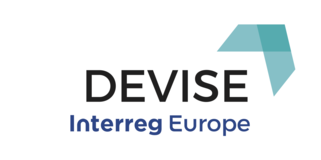Interreg Europe awarded the DEVISE partnership with an extension of one year to complete some additional activities that will contribute to the improvement of the policy instruments addressed by the project partners and to develop new learning experiences in the context of COVID-19.
These activities have already commenced within the exchange of experience process and, through a series of news items, DEVISE partners will share with you the findings and results of the recently concluded COVID-19 Regional Context Assessments in relation to digital transformation of targeted SMEs and some successful COVID-19 good practices package production.
Our virtual trip commences in West Romania, where our partners Cristian Gotia and Karla Hategan, from Western Regional Development Agency, tell us more about the findings and results of the recently concluded COVID-19 Regional Context Assessment. Cristian explains that for the COVID-19 Regional Context Assessment, they have consulted four main information sources: the National Statistical Office, National Digitalisation Authority, Chamber of Commerce and their own organisation. They have compared studies from the beginning of the pandemic and they have collected data from one year after the COVID-19 started. Among the main findings, Cristian highlights that, at national level, the digital level is “low”. He explains that Romania is placed at the bottom of the European rankings in terms of the share of SMEs that have a plan or strategy to digitalise their own business. Furthermore, the same position would apply when referring to the adoption of basic technologies and advanced technologies.
According to him, “uncertainty and low resilience” were prominent at the beginning of the pandemic crisis. “In March 2020, 21.2% of the companies were not able to anticipate what was going to happen in their own sector due to the COVID-19 situation”, continues Cristian. Moreover, 1 out of 5 managers estimated a 25% reduction of the activity; 48% of the managers didn’t know how their economic activity would evolve; 50% estimated that the most affected would be the SMEs meaning reduction of even closure; 43% didn’t know what was going to happen to their own employees. “The most affected within the manufacturing sector were the automotive, electrical equipment, metal construction and metal products and metallurgical industry”, adds our partner. The 21.6% of the small commerce were estimating the temporary closing of their businesses and new business creation rate dropped to half in Timisoara.
After one year of pandemic, 40% of the respondents didn’t intend to change their business model, at list for the short term, and they continue to improve the actual model (11%). Only 6.7% were pointing the digitalisation and online development (%8.6).
Regarding E-governance, our partners have identified 110% increase of users, 180% increase of registered institutions and 190% increase of amount of funds collected on the e-payment platform. The adoption of digital technologies seems to have increased as well. Among other figures, Cristian highlights that 72% adopted digital solutions; 71% online work solutions among their own employees; 69% work online with public institutions; and, 67% are online ordering or contracting solutions.
Good practices in West Romania
Our DEVISE partner, Karla, shares two local good practices to improve the digital transformation of targeted SMEs. The first one is entitled ‘Digitalisation needs surveying’, a programme to help to identify needs for digital transformation and funding areas. It also helps understanding the benefits and barriers of the digitalisation and prepares SMEs for the next generation of funding during the 2021-2027 period.
The second good practice refers to the ‘EENCanHelp’ campaign to meet new businesses and technology partners, new business models and to develop the planning of a digitalisation process.
Stay tuned!
Photo caption: a graphic from the 2021 DESI Index report, also showing the situation at national level, but with a insight into increase in e-commerce and subsequently AI (digital analytics, prediction and behavior) as well as increase of ICT in sustainability matters.











